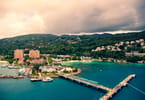(eTN) – Terrorism, poverty, and the malaria pandemic are the biggest enemies looming in Africa when American President Barack Obama visits this continent.
South Africa and Tanzania, all sub-Saharan Africa states, more or less, face similar problems but with quite a big difference.
Malaria is a number one killer disease in Tanzania’s population of 45 million, killing about 60,000 people every year, mostly pregnant women and children under 5 years of age. Every year, between 14 and 18 million malaria cases are registered.
Former US President George W. Bush visited Tanzania early in 2008, and he dished in millions of dollars in malaria control programs which dropped malaria transmission through distribution of 28 million mosquito nets and anti-malaria pills.
For most Tanzanians, America remains a good friend by its humanitarian support in lifting the health sector. Television and radio jingles and adverts on health campaigns conclude their messages to the public saying, “By the kindness of the American people.”
Poverty is the other enemy looming over the lives of Tanzanians, where families go without a balanced diet, leave alone other living essentials including safe water, medical services, lighting services, better educationm and access to information.
But, terrorism is an evil looming as well across the African continent and which the United States has to support African nations in fighting this creeping evil which is going to destabilize peace in Africa.
When Obama lands in Tanzania, he will visit and lay a wreath at the memorial for the victims of al-Qaida’s 1998 bombings of the US embassies in Tanzania which killed 11 people.
Terrorism is a new vocabulary word that was captured by the Tanzanian media just after the bombing of the US embassy in the capital city of Dar es Salaam.
Today, terrorism is no longer a new vocabulary word, but a common word in the media after two bombs have rocked Tanzania’s northern city of Arusha, one in May and another blast this month (June).
According to security analysts, terrorism is moving fast across Africa, from northern Nigeria where Boko Haram Islamists are killing minority Christians, down to the Horn of Africa where Somali Al-Shaabab terrorists are bombing and killing innocent people in Kenya. The Islamic terrorist group Al-Shabaab based in Somalia poses a threat across the East Africa region.
Somali pirates, security analysts say, are working hand in hand with the global terror network to hijack ships crossing the east coast of the Indian Ocean. Porous borders between East African nations of Kenya and Tanzania have been cited as one among key factors leading to smooth passage of terrorists.
Lack of properly trained anti-terrorism security personnel and bribery at points of entry are the other reasons which raised eyebrows as to whether Tanzania and other East African nations could manage to fight international terrorism. Security in East Africa remains a paradox with people living under fear of a possible blast at public places.
Terrorism has as well, crept to Tanzania where a group of Islamist fundamentalists rose to kill Christian minorities in the semi-autonomous island of Zanzibar.
In recent years, there have been attacks against Christians on the island of Zanzibar and in some parts of the Tanzania mainland by people believed to be Islamic radicals who promised, in leaflets in January this year, that they would make more attacks particularly targeting Christian Church leaders.
A Catholic priest, Father Evarist Mushi, was killed on his way to conduct a Sunday congregation. Following the murder of Father Evarist Mushi on the island of Zanzibar in February this year, Tanzanian Bishops issued a statement through the Christian Leaders Forum in Tanzania calling upon the government to take action against anti-Christian propaganda spread by a faction of Muslim fundamentalists.
A statement by the Christian forum issued to coincide with Easter this year, partially says: “A few Islamists in Zanzibar disseminated an ideology asserting that the Islamic majority in Zanzibar (99 percent) should not tolerate any other religions.”
From Zanzibar, terrorism had spread to the mainland Tanzania and hit the northern tourist capital of Arusha, known as the Geneva of Africa.
Presiding Bishop and Head of the Lutheran Church in Tanzania, Dr. Alex Malasusa, said, “Intimidation using bombs, violent acts against the clerics, and torching of church buildings may persecute the church, but such acts should not discourage to pray.”
The Apostolic Nuncio to Tanzania, Archbishop Francisco Padilla, who escaped a bomb blast in Arusha on May 5 of this year said, “I pray that peace will always reign, that violence would not be the way to resolve tensions.”
The state of insecurity threatened many, including the head of the Catholic church in Tanzania, Polycarp Cardinal Pengo, who called on religious leaders and the government to work together to ensure peaceful co-existence between Christians and Muslims in this country.
Terrorism in Tanzania has so far, brought a negative image to the tourism sector. The state of insecurity in Zanzibar remains the biggest concern for tourism, the Minister forI, Tourism, Culture and Sports, Mr. Said Ali Mbarouk, has admitted.
“We need to maintain peace and stability to promote tourism. It is very unfortunate that Zanzibar recorded fewer tourists last year compared to 2011,” he said. The Zanzibar’s Tourism minister had attributed the low number of tourists to violence that gripped Zanzibar.
He said the number of tourists who entered Zanzibar from January to November 2011 were 153,747, but the number dropped to 150,026 after the unrests which scared away tourists.
“We hope to minimize future unrests by involving community and religious leaders. We are planning to launch tourism committees in wards,” he said.
WHAT TO TAKE AWAY FROM THIS ARTICLE:
- Following the murder of Father Evarist Mushi on the island of Zanzibar in February this year, Tanzanian Bishops issued a statement through the Christian Leaders Forum in Tanzania calling upon the government to take action against anti-Christian propaganda spread by a faction of Muslim fundamentalists.
- In recent years, there have been attacks against Christians on the island of Zanzibar and in some parts of the Tanzania mainland by people believed to be Islamic radicals who promised, in leaflets in January this year, that they would make more attacks particularly targeting Christian Church leaders.
- When Obama lands in Tanzania, he will visit and lay a wreath at the memorial for the victims of al-Qaida’s 1998 bombings of the US embassies in Tanzania which killed 11 people.






















